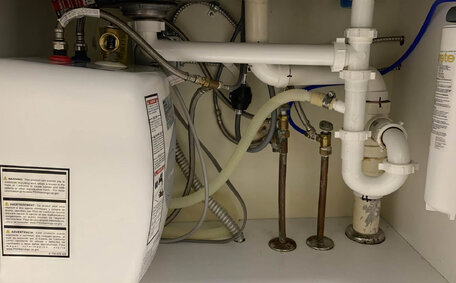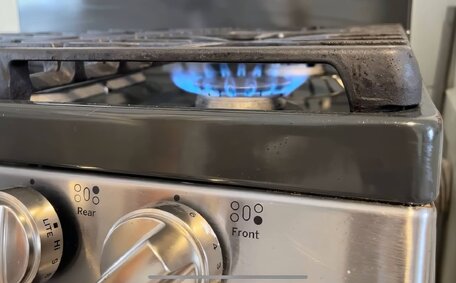Introduction to Natural Gas and its Benefits
Natural gas is an extremely versatile and clean-burning fossil fuel that offers many financial and environmental benefits compared to other energy sources. Used widely across Australia for purposes ranging from home heating and cooking to power generation, natural gas is a cost-effective way to meet energy needs while producing far lower carbon emissions than oil or coal.
Some key advantages of natural gas include:
- Lower energy bills - Using efficient natural gas appliances like furnaces, water heaters, stoves and dryers can reduce monthly energy costs by over 50% compared to electricity.
- High efficiency - Modern natural gas systems and appliances offer exceptional efficiency. For example, a natural gas power plant can convert up to 60% of fuel into usable energy whereas coal plants max out at around 45%.
- Cleaner burning - Natural gas emits nearly 30% less carbon dioxide than other fossil fuels when burned. This makes it a greener transitional energy source as renewables like solar and wind are further adopted.
With extensive experience spanning over five decades, Jamisontown Plumbing excels in providing natural gas system services, including installation and repair, for both homes and businesses.
As natural gas prices remain stable, we help homeowners and businesses determine if shifting more of their energy load to this versatile, affordable and lower-emission
fossil fuel makes environmental and financial sense.
Comparative Cost Savings of Natural Gas
Average Cost Per Kilowatt-hour (kWh) by Energy Source
| Electricity | $0.25 |
| Natural Gas | $0.06 |
| LPG | $0.24 |
As illustrated in the table, natural gas is significantly more affordable than electricity or LPG on a per unit basis. Based on average pricing, using efficient natural gas appliances instead of electric ones could reduce monthly power bills by over 60%.
Gas heating incurs an average annual cost of about $580 compared to $1500 for electric systems, underscoring the savings.
These savings apply to water heaters, stoves, ovens and other gas appliances too. Especially for commercial kitchens, the lower price and higher heat output of natural gas equals big cost reductions.
With stable natural gas prices amid fluctuating energy prices, Jamisontown Plumbing helps residents and businesses determine the most cost-effective and efficient mix of energy sources. By leveraging gas for suitable applications, we help customers realise substantial savings while meeting their needs sustainably.
Lower Energy Bills
Transitioning to high-efficiency natural gas appliances such as water heaters, furnaces, and stoves can result in significant long-term savings on energy bills.
Gas water heaters convert about 84% of the fuel’s energy into useful heat, while electric versions, despite potentially reaching 95% efficiency, incur higher overall energy costs due to the price difference between gas and electricity.
But with gas prices being nearly 4 times lower, gas water heaters cost much less to run.
Natural gas furnaces and boilers also waste less energy compared to electric heating which relies on energy-intensive air conditioners or strip heaters. And gas stoves heat up over twice as fast while providing higher and more consistent temperatures for precision cooking.
Some additional ways to further reduce natural gas energy bills include:
- Installing proper insulation and sealing air leaks around windows and doors
- Upgrading to a high-efficiency condensing gas furnace
- Setting thermostats to 20°C and using programmable timers
- Replacing old appliances with ENERGY STAR®-rated gas models
With Jamisontown Plumbing’s early involvement, we guide new home builders and renovators in choosing the best natural gas appliances to suit their requirements and financial plans.
Going gas for suitable uses leads to lower energy bills and emissions for years to come.
Competitive Cost Per Unit of Energy
When it comes to cost per unit of energy, natural gas consistently ranks as one of the most affordable and competitive options.
The U.S. Energy Information Administration reports that in 2021, the average price per million British thermal units (MMBtu) of natural gas was approximately $3.51, significantly more economical than both heating oil at $12.41 per MMBtu and electricity at $13.07 per MMBtu.
Global market analyses by the International Gas Union consistently show that natural gas offers a cost advantage over other energy sources.
Thanks to abundant supply and its high heating value, the natural gas industry consistently offers more energy per dollar compared to costlier yet less efficient options.
By leveraging gasfired power and optimising the use of raw natural gas, entities like commercial kitchens, manufacturers, and even homeowners can achieve major cost savings in meeting their energy needs.
Versatility and Convenience of Natural Gas Usage
One of the biggest advantages of natural gas is how versatile it is across a wide range of residential, commercial and industrial applications.
Natural gas furnaces and boilers provide dependable temperature control and quicker response times for heating and cooling, outperforming electric systems.
Natural gas water heaters also heat water over twice as fast as electric models, while providing endless hot water.
Natural gas stoves and ovens, favoured for tasks like precision frying and baking, heat rapidly and sustain more uniform temperatures.
This makes them the choice for commercial kitchens and professional chefs.
In the transport sector too, natural gas is increasingly recognised as a cleaner and more cost-effective alternative to diesel and gasoline.
From heavy-duty trucks to public buses to marine vessels, natural gas fuelled engines produce up to 30% fewer greenhouse gas emissions while being cost-effective to run.
With new residential estates and suburbs commonly fitted with mains gas connections, it makes powering homes and businesses with this versatile, affordable and lower-emission energy source convenient. Jamisontown Plumbing specialises in all facets of natural gas systems - from new installations to repairs and maintenance.
Reliability of Supply
One of the most compelling advantages of natural gas is the exceptional reliability and consistency of supply. Unlike electricity which can suffer disruptions during storms, gas supply via underground pipelines related to gas projects is largely protected from external factors.
According to the Australian Energy Market Operator, gas supply interruptions are extremely rare at less than 0.2% annually. This offers peace of mind for facilities like aged care homes and manufacturers that rely on uninterrupted energy access, drawing from robust gas reserves.
The extensive pipeline network servicing major suburban centres like Jamisontown also minimises supply vulnerability. With ongoing network investments and sufficient gas storage, supply consistency enables households and businesses to benefit from this affordable and lower-emission energy source.
Ease of Transport
One of the main benefits of natural gas is that it can be easily transported over long distances via pipeline networks. Compared to transporting other fuels like gasoline or coal, natural gas is one of the most safer, more efficient and cost-effective to move between production facilities, storage hubs and end-users.
Vast underground pipeline infrastructure already exists across Australia, allowing natural gas from remote gas fields gas fields to be reliably delivered to major population centres and industrial regions. Interstate pipelines transport gas thousands of kilometres from the sites of gas extraction to markets efficiently.
Natural gas can also be cooled into liquefied natural gas (LNG) for transport by sea. This involves cooling it to -160°C to shrink its volume 600 times for storage and shipping in specialised tankers. Upon reaching its destination, the LNG is reconverted into gas and channeled into the main gas grid or pipelines.
The simplicity and cost-effectiveness of transporting natural gas translates into consumer benefits such as more accessible energy prices.
For exporters, it allows Australian gas to competitively reach growing Asian markets, as findings are often published online.
Environmental Advantages of Natural Gas
Compared to other fossil fuels such as coal and oil, natural gas provides significant environmental benefits, aiding in climate change mitigation efforts.
When burned, natural gas emits nearly 30% less carbon dioxide and also produces far lower levels of pollutants like nitrogen oxides, carbon monoxide, sulphur dioxide and particulate matter.
Natural gas power plants emit 50 to 60 percent less carbon dioxide per unit of energy produced than their coal-powered counterparts, assuming methane emissions are effectively controlled.
Natural gas combined cycle turbines are also among the most efficient of fossil fuel technologies, converting up to 60% of fuel into usable energy.
The shift from coal to natural gas, which is cleaner burning, has already contributed to a significant reduction in U.S. power sector carbon emissions over the past decade. With energy sources like solar and wind experiencing intermittency challenges, natural gas serves as an ideal complement, ensuring grid reliability during transitions.
More efficient end-use gas appliances also waste far less energy in homes and businesses compared to electric alternatives - saving money while curbing greenhouse gas emissions. As concerns around climate crisis grow globally, natural gas can play a key role in cost-effectively reducing emissions as part of a balanced energy mix inclusive of solar and wind technologies.
Lower Emissions Compared to Other Fossil Fuels
Burning natural gas results in fewer toxic pollutants than coal or oil. According to the U.S. Energy Information Administration, natural gas produces nearly 50% less carbon dioxide emissions and just a fraction of the air pollutants compared to coal-fired power plants when generating electricity.
When comparing emissions, natural gas combustion yields:
- 30% less carbon dioxide than petroleum and 45% less than coal
- 1% of the sulphur oxides emitted by coal plants
- No particulate matter or ash versus high levels from burning coal
This makes increased natural gas usage key for governments aiming to cut emissions in response to climate change under commitments like Australia’s Paris Agreement targets and state net zero emissions goals. It offers a practical way to meaningfully reduce greenhouse gas and smog-forming emissions as renewable energy capacity continues expanding but remains incapable of meeting total energy demand.
We must wholeheartedly endorse the responsible integration of cleaner-burning natural gas with zero-emission renewables like solar and wind for the cost-effective attainment of both local and global climate objectives. We provide gas fitting services to help commercial and residential customers leverage natural gas systems to lower their carbon footprint.
Transition Towards Renewable Energy
Natural gas is a pivotal bridging fuel in the worldwide transition to decarbonised energy systems.
When renewable generation is unavailable, modern natural gas plants can quickly scale up output to keep the lights on affordably and more cleanly than coal.
Natural gas power plants provide reliable baseload electricity and outperform other gas options in supplementing intermittent renewable energy sources such as solar and wind.
Natural gas infrastructure also readily integrates with renewable technologies. Existing gas pipelines, storage facilities and power plants can be repurposed over time for zero-carbon fuels like renewable hydrogen and biomethane. Such hybrid systems enhance grid stability and reliability during the global energy transition.
With over 50 years of experience, Jamisontown Plumbing helps homeowners and businesses install modern systems that combine new natural gas solutions and renewable energy technologies. This delivers substantial cost savings while also allowing customers to meaningfully reduce their environmental footprint as society transitions towards a net-zero future.
Natural Gas Safety and Maintenance Affordability
Natural gas systems require minimal maintenance while providing outstanding safety. Annual visual inspections and leak tests cost under $100, ensuring pipes and appliances operate safely for decades. Compared to costly electric systems upkeep, gas offers savings.
Jamisontown Plumbing is locally trusted for affordable natural gas safety checks and fixes like leak repairs, at half the typical cost. Our experienced technicians ensure appliances function reliably for 20+ years through regular maintenance. By preempting issues early, we save customers thousands in replacement expenses down the track.
The lower maintenance costs, exceptional durability, and safety record of natural gas systems offer better cost-effectiveness for both residential and commercial use over the long term.
Partnering with gas specialists like Jamisontown Plumbing maximises safety, savings and satisfaction from gas system investments.
Call to Action
Natural gas offers clear financial and environmental benefits for Australian homes and businesses. To determine if transitioning some energy needs to this affordable, efficient and lower-emissions fuel makes sense, contact Jamisontown Plumbing today!
Boasting over 50 years of experience, we must be your go-to experts for natural gas installations, servicing, maintenance, and repairs. From cost-savings consultation to pipe and appliance replacement, let us customise the ideal gas solutions for your situation.
For a tailor-made energy solution and a complimentary site inspection, reach out at [email protected] or call 1300 349 338 to explore how natural gas can lower both your energy costs and carbon emissions.






